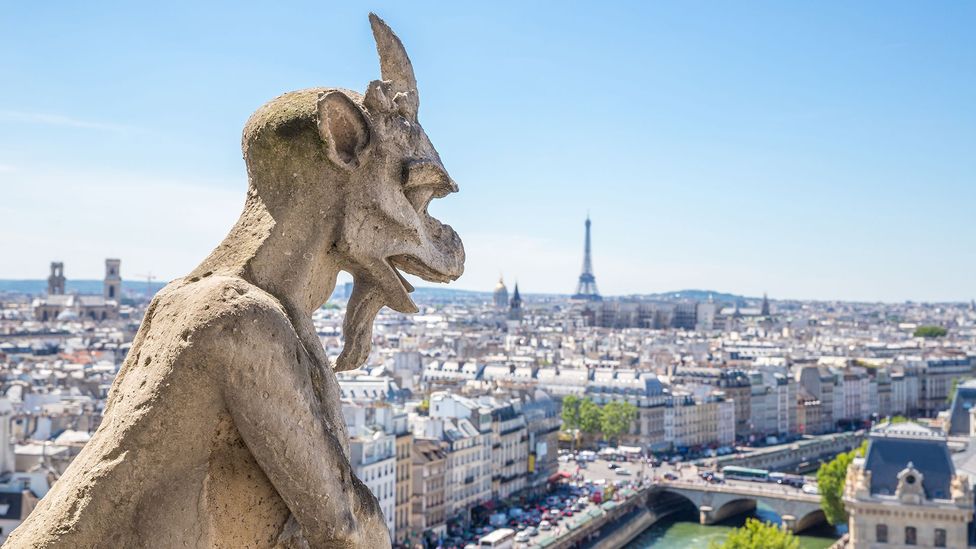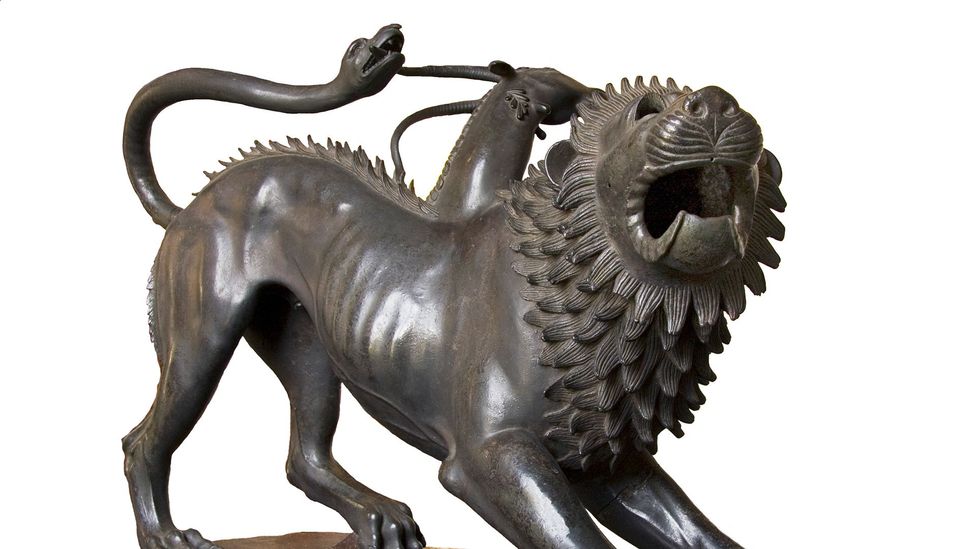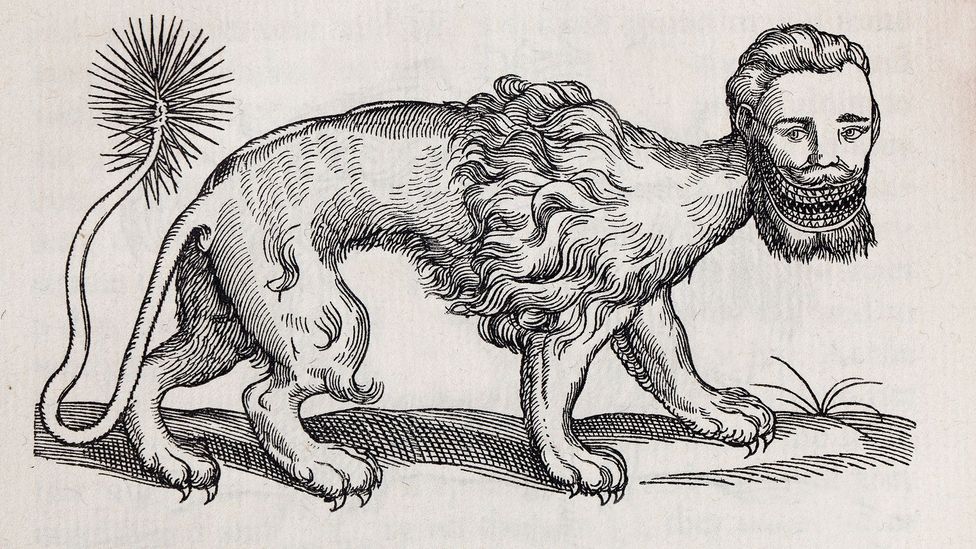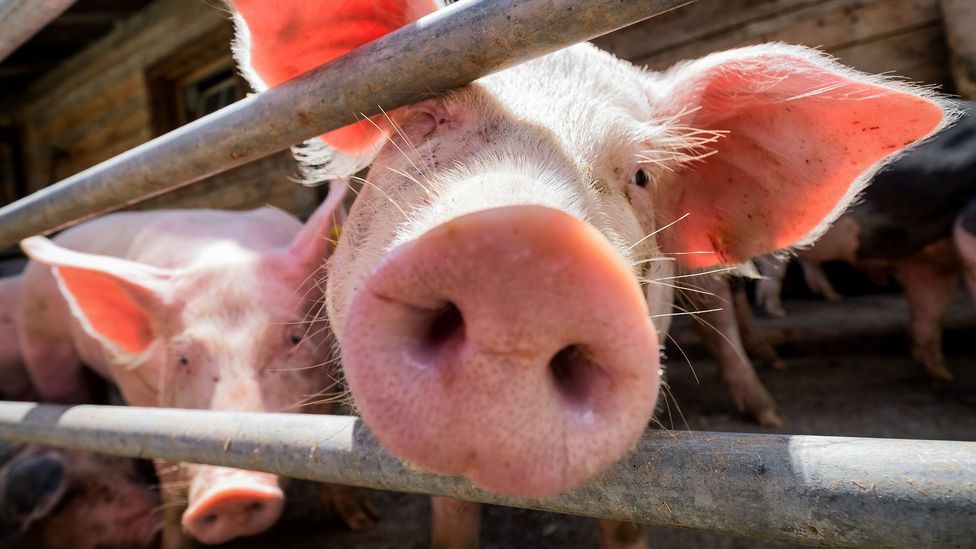Can People Be Part Human And Part Animal
The uneasy truth well-nigh human being-animal hybrids

From The Conversation
Merging animal and human forms brought terror to our ancestors – and this fear persists right the manner into our modern age.
I
In Greek mythology, the Bubble is a monstrous fire-breathing beast, typically described as having the head of a lion, with a snake equally a tail and the head of a caprine animal emerging from its back.
Just every bit it terrorised the minds of the Greeks, this vision is besides the cause of much consternation regarding the successful creation of the beginning human-squealer hybrid embryos at the Salk Institute in California. In fact, such human-creature hybrids are often referred to as "chimeras".
While this scientific advance offers the prospect of growing human organs within animals for use in transplants, it can also exit some people with a queasy feeling. It was precisely this queasiness that led to the moratorium on funding for this programme of research.

Hybrid animals - such equally this Greek mythology bubble - fascinated and repelled the Ancient Greeks (Credit: Scientific discipline Photo Library)
People, information technology seems, just can't tummy the idea of growing human kidneys in pigs.
Given the potential advances that this research offers, our objections should probably be based on more than a balmy case of nausea. Yet there are a few enduring aspects to the style we perceive man-beast hybrids that makes it hard to think about them clearly.
Against nature?
Many of the states are similar half-dozen-year-olds who turn their nose up at the idea of mixing their broccoli with their mashed murphy. We prefer to keep things pure. Whether information technology is cross-bred animals or racially mixed children, people who run across the world equally defined by underlying essences tend to reject this "impurity".
What is an "underlying essence"? It'southward the idea that things have certain necessary properties that are essential to them being what they are. And then there is a kind of "pigness" that is sectional to pigs, and a "humanness" that is exclusive to us.
Only in biological science, at to the lowest degree, there is no actual essence to anything in this sense. We're all made of different combinations of the same kinds of stuff, like proteins and amino acids. Even much of the blueprint – our genes and Dna – are shared across species, such that humans and mice share around 90% of their Dna, and we fifty-fifty share effectually 35% of our genes with the elementary roundworm.
Just this does not hateful that we don't often rely on this way of thinking to empathise what makes a tiger natural in a manner that a chair is not. It is also this intuition that makes us squirm at the thought of a tiger-goat only intrigued by the idea of a chair-table.

The manticore is an example of a human/animal hybrid from medieval bestiaries (Credit: Science Photo Library)
Mixing human and animal biology is perceived as being unnatural and bit on the olfactory organ (much like a laksa risotto I in one case ordered), creating an irrational fear that human-pigs might escape the lab and take over the world (much similar I fear the meteoric rise of Italian-Malay cuisine).
While the possibility of homo-squealer chimera wandering the planet is far from reality, but like the Greeks, our fear of hybrids fosters the sense that such creatures would be monstrous.
While hybrids in general tin can sometimes create a disagreeable mixture of fear and disgust, this is not always the case. Have for instance the boysenberry (a cross between the raspberry, blackberry, dewberry and loganberry) or the clementine (a cross between a mandarin and an orange). Nosotros have picayune trouble consuming such hybrids for our lunch.
Our apparent comfort with some hybrids does non finish at plants. Mules have never been a source of alarm, yet they are the offspring of a male ass and a female equus caballus. And what about the Liger, Tigon, Zonkey, Geep, or Beefalo?
Still, while hybrids in general can create a sense of foreboding, not all hybrids practice, and it may be that mixing biological science is most psychologically problematic when it comes to our own human Dna – and perhaps especially when information technology comes to mixing it with that of other animals.
We are not animals
One reason that human being-pig hybrids are a source of anxiety is that they tin can conjure up a fear of our own death. The possibility that a hog could grow your next pancreas is a cogent reminder that humans are too animals, and this very biological reminder can create existential angst.
The notion that humans have souls, but animals practice not, was (and nevertheless is for some) a popular belief. It gives us a sense of being superior, above or outside the biological order. Harvesting human hearts from goats can shatter this protective belief, leaving united states of america feeling disgusted and dismayed.
Human-animal hybrids turn one'south mind to the inevitable fact that we will all be pushing up the daisies one mean solar day. Past keeping thoughts of our beast nature at bay, we conveniently forget that we are nothing more than mortal biological organisms waiting to fertilise the fields.

Would we be less likely to eat pigs if nosotros were using them to grow human organs? (Credit: iStock)
Another reason that growing a spare liver in the pig on your uncle'southward farm while subjecting your own to a bad case of cirrhosis may create unease is that doing so confuses the tastebuds. We eat pigs, not humans. Would you still enjoy bacon if it came from the sus scrofa who had nursed your liver for the past six months?
More than powerfully, the prospect of pig-humans too confuses the moral compass. Biologically merging pigs with humans reminds us of our shared similarities, something that we mostly endeavour to forget when savouring the smell of frying bacon.
We tend to maintain clear boundaries between those animals we consume and those we practice not, as this helps to resolve the sense of discomfort that we might otherwise feel about using animals for food. It was this very confusion of boundaries that led to outrage over the prospect of equus caballus meat in burgers during the 2013 horse meat scandal; horses are perceived as pets or companions, not food.
If confusing pets with animals we swallow creates discontent, and then confusing those same meat-animals with our own kind is sure to create moral and gustatory hesitation.
Beyond baffling our palate, information technology besides confounds our agreement of whether it is an brute from whom nosotros are harvesting our adjacent-generation organs, or some kind of sub-human entity. Indeed, harvesting organs from humans conjures visions of a dystopian future (https://en.wikipedia.org/wiki/The_Island_(2005_film).
In the terminate, while mythical hybrid beasts may have caused alert for the Greeks, it would seem that our own objection to growing our next eye in the breast of a pig has more to exercise with existential angst and a disruption of the moral order.
Whether or non we should use animals for these purposes, or for the satisfaction of human needs more than broadly, is a topic for another time. Yet it is safe to say that our personal fearfulness of this scientific accelerate – the queasiness we experience in the gut – may be by and large to do with how it destabilises our perceived human uniqueness and undermines our own moral superiority than anything to do with broader concerns over hybrids themselves.
This article originally appeared on The Conversation, and is republished nether a Creative Commons licence.
Bring together 800,000+ Futurity fans by liking usa on Facebook , or follow us on Twitter .
If you liked this story, sign upwardly for the weekly bbc.com features newsletter , chosen "If You Only Read 6 Things This Week". A handpicked selection of stories from BBC Future, Earth, Civilization, Capital letter, and Travel, delivered to your inbox every Fri.
Source: https://www.bbc.com/future/article/20170222-the-uneasy-truth-about-human-animal-hybrids
Posted by: rileynoweapping.blogspot.com

0 Response to "Can People Be Part Human And Part Animal"
Post a Comment